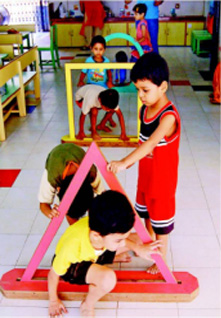Resources
rhyme & reason
Lubna Kably and Madhavi Rajadhyaksha | March 30, 2013 A hole-in-the-wall cramped with 30 toddlers pass off as a playschool. A drawing-room in an apartment building is converted into a creche from 9 am to 6 pm. An anganwadi in a rural hamlet has no choice but to send its tiny tots outdoors every time they want to pee, for want of an indoor toilet.

The early childhood care and education (ECCE) sector in India which determines the future of over 16 crore children below six years of age – an age group scientifically proven to be the crucial formative years for socio-emotional and cognitive intellectual development lasting into adulthood – has largely been operating as a cottage industry of sorts. Even the Right to Education Policy has left out this age group.
This free run, especially by unscrupulous players is set to end with the Ministry of Women and Child Development introducing a draft ECCE policy. The draft spells out minimum quality standards that playschools, creches, anganwadis, and nurseries (both government and private players) should follow in order to earn a government stamp of accreditation.
The quality standards are wide-ranging, and in the process of accreditation, weightage will be given to parameters such as the physical environment (such as available space, drinking water, and toilet facilities); adult supervision (with an adult-child ratio prescription ); and teacher’s qualifications, to name a few.
In addition, the draft ECCE policy outlines a common curriculum framework that would guide preschools on age-specific developmental parameters for children. For instance, children below three should be engaged in free play or those above four could be initiated into writing from left to right. Many countries, including developing countries, have similar norms in place, which often are mandatory for all players in the ECCE segment (see box). India’s ECCE draft policy is at a nascent stage but debates about its feasibility are already raging. After all, the sector is marked by wide disparity, ranging from free-of-cost state-run anganwadis to a handful of pre-schools boasting world class standards and international affiliations, albeit at a hefty price.
Is it then fair to paint all private and public preschools with the same brush? Are the standards proposed by the ministry apace with real-time constraints of space, staff and infrastructure? Is such government regulation warranted at all? The jury is still out.
Sujata Sriram, core member of the Association for Early Childhood Education and Development, believes the quality norms are absolutely essential. She states: “Until recently, ECCE wasn’t seen as lucrative as higher education, but private players are now mushrooming. Many are milking the public and there is absolutely no accountability.”
The standards in question lay down certain ‘non-negotiable’ conditions. For instance, the draft requires that a classroom accommodating 30 children be at least 35 square metres in area and provide 30 sq m of outdoor space. It also mandates separate toilets for boys and girls.
Rajesh Bhatia, founder and managing director of Tree House which provides pre-school education across India, welcomes quality standards but believes some aspects need to be pondered over. “Such space norms might be feasible in Kolhapur, for instance, but are not practical for a city like Mumbai, ” he says, pointing out that higher education school boards such as CBSE and ICSE have different spatial norms for metros and other cities, a pragmatic approach which should be adopted by the ECCE as well.
“There is a crying need for improving standards in the ECCE segment. Yet, regulations in any form must not deter those private players who wish to provide the best global standards, ” states Arun Arora, chairman, Edvance Pre-schools, which in collaboration with Eton House of Singapore, has set up 40 preschools across India.

“If certain quality standards are to be introduced, such as a minimum space requirement, it is also essential that the government must act as a facilitator. For instance, in some congested areas of Mumbai, space is just not available. Here government land could be made available for nurturing the ECCE segment. Credit lines at differential rates of interest would give this sector a huge boost, ” adds Arora.
The draft ECCE policy also stipulates that service providers in the ECCE segment follow an adult-child ratio of 1:20 in the 3- to 6-year age group, and 1:10 ratio for under three-year-olds. It highlights the need for teacher’s education, even as it doesn’t spell out the minimum qualifications.
But can this really be implemented given our shortage of trained staff? Reeta Sonawat, executive director of the Early Childhood Association in India (ECA-India ) admits that we have a shortage of teachers at all levels. “But we don’t compromise in high school with teachers who lack basic BEd degrees. Then why compromise on quality in the ECCE segment?” she asks.
Let's understand that a minimum one-year qualification with at least 600 hours of hands-on-internship is a must. The ECA is against the three-month courses that are now thriving.
- Swati Popat Vats
To account for the wide disparity in the educational background of ECCE teachers, teachers at Edvance for instance, are classified into categories. “Much of what they have learnt has to be unlearnt, and on-the-job training in addition to formal training via workshops is vital. It could take anything from a year or more to go from being a trainee teacher to the next level, ” explains Arora. Sriram also believes that innovative methods such as peer tutoring and cooperative training could be adopted to plug this major lacuna in the system.
There are, of course, those who question the very rationale of regulation, arguing that it has failed to inject quality into higher education. They say the mechanism of accreditation will create corruption. “First, let’s set up a policy and see how it will work. After all, ECCE service providers have been offered the choice of following the accreditation norms, ” sums up Sriram. It’s left to be seen how many make the move.

